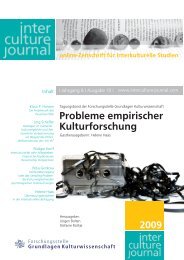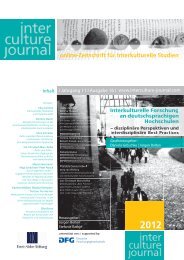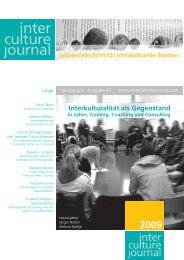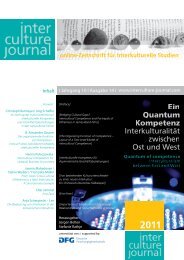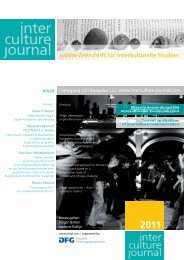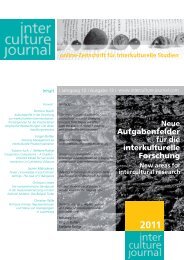Interkulturellen Kompetenz forschung - Frankfurt School of Finance ...
Interkulturellen Kompetenz forschung - Frankfurt School of Finance ...
Interkulturellen Kompetenz forschung - Frankfurt School of Finance ...
Sie wollen auch ein ePaper? Erhöhen Sie die Reichweite Ihrer Titel.
YUMPU macht aus Druck-PDFs automatisch weboptimierte ePaper, die Google liebt.
Mader / Camerer: International English and the Training <strong>of</strong> Intercultural Communicative Competence<br />
uses the research incorporated in the Common European<br />
Framework <strong>of</strong> Reference for Languages as well as that <strong>of</strong><br />
Gumperz, Byram, Beneke, Müller-Jacquier and others. These<br />
have led to the development <strong>of</strong> criteria for the definition,<br />
training and ultimately testing <strong>of</strong> intercultural communicative<br />
competence and its consequences for curriculum design.<br />
4. Intercultural Communicative Competence<br />
The examination <strong>of</strong> discourse features may well provide useful<br />
information for intercultural understanding, as it is language<br />
which ultimately makes up interaction, and it is almost<br />
always a person’s use <strong>of</strong> language which defines our perception<br />
<strong>of</strong> their intercultural competence. Interestingly language<br />
is almost entirely ignored in the many definitions <strong>of</strong> intercultural<br />
competence which are used to provide the basis for<br />
training curricula and tests, the results <strong>of</strong> which can have farreaching<br />
effects on individuals’ careers. Competence can be<br />
usefully defined as<br />
“…more than just knowledge and skills. It involves the ability to meet<br />
complex demands, by drawing on and mobilising psychosocial resources<br />
(including skills and attitudes) in a particular context. For example, the ability<br />
to communicate effectively is a competency that may draw on an individual’s<br />
knowledge <strong>of</strong> language, practical IT skills and attitudes towards<br />
those with whom he or she is communicating.” (OECD 2003:4)<br />
The critical elements are a) the role <strong>of</strong> context and b) the role<br />
<strong>of</strong> performance. Competences are played out in the social<br />
and physical environment – and thus the pro<strong>of</strong> <strong>of</strong> competence<br />
lies in its active performance. To put it quite simply:<br />
when we speak <strong>of</strong> intercultural competence we mean intercultural<br />
communicative competence. Intercultural communicative<br />
competence is not the same as language competence<br />
to be sure, yet it is difficult to imagine intercultural competence<br />
without considering language. We suggest it is the intercultural<br />
use <strong>of</strong> language we should be looking at, which<br />
includes learning how to find out about other ways <strong>of</strong> thinking<br />
and communicating, how to become more open to them<br />
and to develop our personalities to function in a culturally<br />
appropriate way in contexts other than our own. And, at the<br />
same time, do business successfully by building rapport, thus<br />
allowing a positive relationship to develop. For this reason<br />
politeness is the core competence in intercultural communication<br />
– politeness not in the sense <strong>of</strong> following rules <strong>of</strong> etiquette<br />
(although this too can be important), but as a way <strong>of</strong><br />
building rapport. Politeness conventions however may vary<br />
considerably, for what may be sufficiently polite or acceptable<br />
in one culture may be impolite and completely inacceptable<br />
in another (Hickey / Stewart 2005). So what makes a person a<br />
© Interculture Journal 2010 | 12 102



